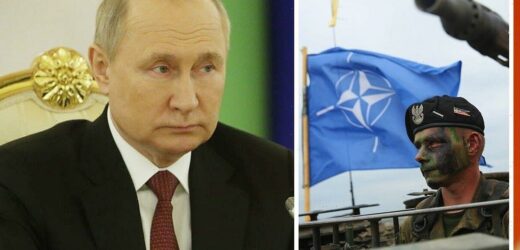Russian lawmaker fantasises about kidnapping Nato officials
We use your sign-up to provide content in ways you’ve consented to and to improve our understanding of you. This may include adverts from us and 3rd parties based on our understanding. You can unsubscribe at any time. More info
Moscow’s plans for a rapid and efficient invasion of Ukraine were thrown under the bus once the Kremlin started to realise Ukrainian resistance would quash such ambitious plans. With the war exceeding well over 100 days, Russian forces have been continually pushed back by Ukrainian defences, leaving troops, tanks, aircraft and weaponry killed or destroyed.
A study by the International Institute for Strategic Studies (IISS), the RAND Corporation and the Swedish Defence Research Agency all conducted war games exercise to simulate the outcome of a NATO conflict with Russia prior to the war with Ukraine.
Although the independent studies all created varying conditions to the model, including the withdrawal by the US from a conflict, all three scenarios delivered similar results.
According to Robert Dalsjö, Director of Research at the Swedish Defence Research Agency, Michael Jonsson, head of the Defence Policy Studies programme at the same agency and Johan Norberg, Deputy Research Director and analyst of Russian military affairs, also at the agency, say the results make disturbing reading for NATO.
Studying the results, the trio wrote: “Russian forces would likely defeat NATO and national troops in Northern Europe, at least during the first phase of fighting.
“Even a critique of the IISS scenario-based study, meant to demonstrate that Europe could indeed defend itself, argued that NATO would probably face partial defeat initially but could then successfully counter-attack.”


All three studies suggest that Russian air forces would easily be able to gain air superiority over the Baltic States should a short-term conflict occur.
However, recent events in Ukraine have shown the models to be wrong, as demonstrated by Ukraine’s ability to destroy so many Russian fighter jets and helicopters.
With Russia also heavily reliant on ground assaults, the experts suggest Russian convoys would be easily picked off by NATO assets.
They wrote: “To illustrate, the effect of Western airpower on Russian convoys such as those in Ukraine could quickly evolve into a situation reminiscent of the Highway of Death in the First Gulf War.”


Furthermore, the models stated that Russian ground forces were larger and heavier than eastern European NATO members.
This was also combined with Russian superiority in artillery batteries, ground-based air defences and electronic warfare units.
Yet the model was once again undone by the analysts who said: “The poor performance of even elite Russian armoured and mechanised units against Ukrainian ground units without air support (except armed drones) raises serious questions about how swiftly the former could be expected to advance against defenders who are dug in and well equipped, especially in urban areas or difficult terrain.”
Writing for Taylor and Francis Online, the trio added: “Russian artillery remains a significant threat, but its electronic-warfare measures do not seem to have been effective.”
DON’T MISS:
Russia threatens ‘major’ outbreak of fatal disease [REVEAL]
Russian commanders go rogue as humiliating demise exposed [REPORT]
Biden humiliated as reliance on RUSSIA for ammo exposed [INSIGHT]

Finally, the experts slammed the performance of Russian personnel throughout the war, suggesting poorly trained, under-resourced and demoralised conscripts have failed to live up to the mighty reputation of the Russian army.
Summarising the models, and the lessons to be learned by NATO following the invasion of Ukraine, the experts suggested Russia’s pride has been damaged.
For more stories like this, follow Defence and Security Correspondent James Lee on Twitter: @JamesLee_DE

They concluded by saying: “A crucial conclusion is that fighting back has paid off for Ukraine in existential terms, and for NATO in providing critical insight into the state of Russia’s armed forces.
“Reconstituting Russian military power will be costly, time-consuming and technically challenging.
“While the Russian military did notably worse than Western observers expected, however, this should not be considered a strictly reliable guide to future assessments.
“Russia probably would not repeat this mistake in future conflicts.”
Source: Read Full Article


